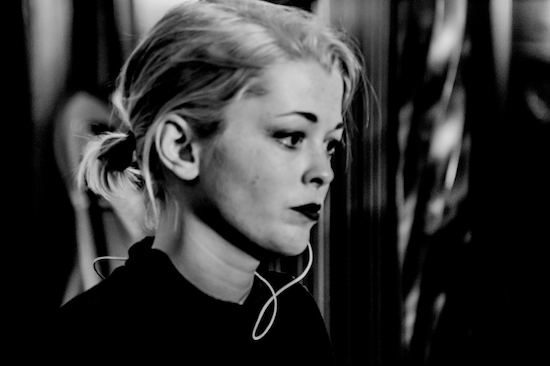Photo credit: Elspeth Moore
It’s 2017 and I’m in a cigarette-smoke filled basement, one of the TARDIS-like underbellies of the Victorian terraced houses in Hyde Park, Leeds. Under a ceiling adorned by trite, new age-y wall hangings and illuminated by the glow of green fairy lights, a bassist is strumming along to the jangly keys of an upright piano. The room is packed with people, nearly obscuring the vocalist entirely, who periodically dips down to smash one of the pedals at her feet. Somewhere in between pop, shoegaze and soulful electronica, the band’s name escapes me, and the memory merges with many similar gigs of that time. During my three years undertaking a BA in the city, on nights out, I quickly learned to follow students from the conservatoire and college of music. Inevitably, I’d be led to another damp darkroom, former working men’s club or unassuming community centre where a surreal concert would be taking place. Leeds is peppered by a smorgasbord of independent venues that host its thriving jazz scene, including the roster of Tight Lines, a label lauded by the likes of Gilles Peterson, an ever-expanding cast of bands and eclectic electronic nights, such as the UK’s (allegedly) longest-running club event Back To Basics. Listening to Carmel Smickersgill’s We Get What We Get And We Don’t Get Upset immediately transported me back to this particular, Northern musical context – one that’s infused with jazz’s freewheeling’s experimentation, the plodding punctuation of house and instrumental oddities.
Originally from Leeds, Smickersgill picked up the guitar in indie bands and jazz combos, before finding herself drawn to writing and arranging music. At the Royal Northern College of Music in Manchester, she studied under the tutelage of renowned composer Gary Carpenter – one of the minds behind the cult score of The Wicker Man (1973) – and began nurturing an interest in drama and theatre, as well as working on numerous chamber and vocal pieces. Her compositions have been performed by the Liverpool Philharmonic and Glasgow-based collective Galvanise, and in 2017 she appeared with New Order as a member of ∑(No,12k,Lg,17Mif) for the group’s Manchester International Festival commission.
Playing as part of a tightly oiled ensemble has clearly left its mark. The EP is characterised by slick and cavernous harmonies resembling the work of a multitude of musicians rather than an individual composer. For the single ‘Leaving’, Smickersgill introduces live percussion, slapping bass and her own distinctive double-tracked wails reminiscent of the immersive 3D soundscaping and melodic intricacies of pop experimentalists Animal Collective. A clear standout is ‘Questioning’. A transcendent patchwork of shattered vocal snippets, the song’s theatrical drop is marked out not by warbling bass, but instead by an uplifting flute refrain, flexing a mind-bending manipulation of sonic textures. ‘Greeting’ is structured by rolling, repeating shepherds tones (a kind of auditory illusion whereby octaves are overlaid, giving a sense of rising higher and higher).
Much like an indulgent feeling of nostalgia, there’s also something intoxicatingly syrupy about We Get What We Get And We Don’t Get Upset. From the toothache crunch of ‘Greeting’ to the nougat-laden lyrics of ‘Interval’, the EP is surreally, addictively sweet. On the latter track, two voices giggle through a list of pleasant sounds, tastes and experiences: Water boiling, chocolate cake, every animal you will come across today even rats, being kind, crunchy leaves, fresh sheets. A tin whistle, the very first instrument Smickergill learnt to play as a child, shrieks plaintively, accompanied by euphoric synth melodies. Yet there’s a sinister cadence too. Akin to her friend and collaborator Bunny Hoova, Smickergill unites pop sensibilities with the uncanny, melding pastoral images of nature with off-kilter chords and disturbingly droning passages. Final song ‘Leaving’ sets out to conjure a "remote island somewhere, watching turtles swimming in the sea," but the reverb-drenched vocals partnered with the impossibly high pitch of the screaming whistle are unsettling rather than idyllic.
“Silly music that comes from serious places,” is how she describes the EP’s unheimlich sonic palette. “There was a lot of grief, death, mental illness and dread around me at the time I was writing it. The tracks really are an ode to all the people I cared about who were suffering. But there are parts where I’ve put stuff in because I want to catch people out and make them laugh.” With this mantra, she’s clearly succeeded as We Get What We Get And We Don’t Get Upset skips between theatrical doom and bewitchingly pleasant interludes. In this sense, the record bears a staunch resemblance to Smickersgill’s mentor Anna Meredith, whose genre-crossing releases similarly straddle classical, art pop and drone. The release also slots in neatly alongside Oliver Coates and Hannah Holland on PRAH Recordings, artists who likewise meld pop-inspired electronics with foreboding experimentation. There are times, however, when things fall a little flat and minimal. Take the stripped back melody of ‘Thinking’ – the drum machine and plunking xylophone-like notes fail to reach a crescendo and instead meander on non descriptively. Even here, though, there’s a seed of weirdness as for the final minutes, the tin whistle returns for some uninhibited, joyful screeching. It’s in these moments when Smickersgill refuses to take herself too seriously that We Get What We Get And We Don’t Get Upset reaches its sugar-high peak.


